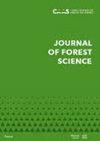混合云杉的潜力(L.)岩溶。中部波西米亚低地地区的西尔维斯特松森林
IF 1.1
Q3 FORESTRY
引用次数: 0
摘要
混交林发挥aÂ关键作用inÂ在ofÂ稳定性、生产潜力和适应toÂ气候变化方面。InÂ此外,所研究的挪威云杉[Picea abies (L.)]岩溶。]和苏格兰松(Pinus sylvestris L.)属于toÂ最重要的经济树种inÂ欧洲。目的是toÂ确定效果ofÂ树种组成ofÂ这两个乔木属onÂ产量、结构、多样性和生长ofÂ混交林atÂ低海拔inÂ捷克共和国。以onÂ树木生态样品为基础,研究了onÂ气候因子和气候变化对ofÂ树木径向生长的影响onÂ这些树木ofÂ的兴趣。混交林的木材产量by 29.8%高于toÂ云杉和松木单一栽培。产量ofÂ成熟林分328 ~ to 479 m3·ha-1。云杉具有较高的径向生长,但其生长变异性高于ofÂ松树。与toÂ降水相比,温度对onÂ两树种径向生长的影响aÂ更大ofÂ,尤其是对inÂ生长季节的影响。InÂ项ofÂ多样性中,混合林分的结构分化和总体多样性显著高于toÂ单特异变异。混合林分可以实现更高的生产潜力,多样性,特别是抵抗toÂ极端气候inÂ低地地区ofÂ捷克共和国。混交林与单一林分的差异,i.e.Â树种混交效果ofÂ取决于onÂ适当的比例ofÂ树种及其空间格局。本文章由计算机程序翻译,如有差异,请以英文原文为准。
Potential of mixed Picea abies (L.) Karst. and Pinus sylvestris L. forests in lowland areas of Central Bohemia
Mixed forests play a key role in terms of stability, production potential, and adaptation to climate change. In addition, the studied Norway spruce [Picea abies (L.) Karst.] and Scots pine (Pinus sylvestris L.) belong to the most economically important tree species in Europe. The objectives were to determine the effect of the species composition of these two tree genera on the production, structure, diversity, and growth of mixed stands at lower elevations in the Czech Republic. Based on dendroecological samples, research was also carried out on the influence of climatic factors and climate change on the radial growth of these trees of interest. Mixed forests showed higher timber production by 29.8% compared to spruce and pine monocultures. The production of mature stands ranged from 328 to 479 m3·ha–1. Spruce achieved higher radial growth, but its growth variability was higher than that of pine. Compared to precipitation, temperatures had a greater influence on the radial growth of both tree species, especially in the growing season. In terms of diversity, mixed stands achieved significantly higher structural differentiation and overall diversity compared to monospecific variants. Mixed stands can achieve higher production potential, diversity, and especially resistance to climatic extremes in the lowland regions of the Czech Republic. The differences between mixed stands and monocultures, i.e. the effect of tree species mixing, depend on the appropriate proportions of tree species and their spatial pattern.
求助全文
通过发布文献求助,成功后即可免费获取论文全文。
去求助
来源期刊

Journal of forest science
Forestry-
CiteScore
2.30
自引率
9.10%
发文量
48
审稿时长
6 weeks
期刊介绍:
Original results of basic and applied research from all fields of forestry related to European forest ecosystems and their functions including those in the landscape and wood production chain are published in original scientific papers, short communications and review articles. Papers are published in English
 求助内容:
求助内容: 应助结果提醒方式:
应助结果提醒方式:


